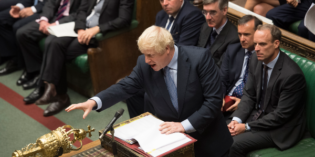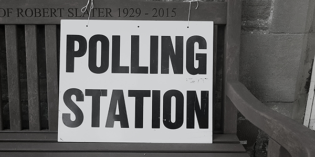General election 2019

General election 2019: a postcode lottery
The 2019 general election produced a strong Conservative majority in the House of Commons, with the first-past-the-post electoral system delivering the party 56% of parliamentary seats on the basis of 43.6% of all votes. Beyond this national figure, Ian Simpson explains, the nations and regions of the UK returned some even more disproportional results, meaning millions of voters across the UK are left unrepresented in Parliament.

A Conservative majority means parliamentary scrutiny is in danger of being weakened
Marc Geddes considers the potential impact the recent Conservative victory may have upon parliamentary scrutiny. The size of the majority, the current government’s agenda for legislative reform and the changes to select committee membership may all have a detrimental effect on parliament’s ability to scrutinise government effectively.

What impact has the general election had on the work of the Intelligence and Security Committee?
Following the failure of the government to publish the Intelligence Security Committee’s report into Russian interference ahead of the election, Andrew Defty examines the impact of the general election on the ISC, outlines the process for the establishment of a new committee and assesses the likely priorities of the reconstituted committee.

First-past-the-post – normal (disproportionate) service has resumed
In the 2017 election the UK’s ‘first-past-the-post’ electoral system operated quite proportionately, as the Conservatives and Labour level-pegged at high levels of support, and squeezed out support for other parties. In 2019, however, FPTP reverted most of the way back to its historic pattern, awarding a huge ‘leader’s bonus’ of seats to the Conservatives in England and to the SNP in Scotland. Patrick Dunleavy explores why the levels of disproportionality have bounced back towards historic levels.

General election 2019: preview of the East of England
In the run-up to the 2019 general election, the Democratic Audit team is previewing the key contests and political divides in each of the country’s regions. Here we discuss the East of England, focusing on the crucial seats for each party based on 2017’s marginal results, the latest polling, and how smaller parties and the Leave-Remain dynamic change the established electoral contests.

General election 2019: preview of South East England
In the run-up to the 2019 general election, the Democratic Audit team are previewing the key contests and political divides in each of the UK’s regions. Here we discuss the South East of England, where behind a blue wall of safe Conservative seats, there is still some variation, with the region ranging from Brexit-voting Tory strongholds to marginal coastal towns and cities, and strongly Remain-voting seats on the edge of London. We focus on the key seats based on 2017’s marginal results, the latest polling, and how some independent candidates and the Leave-Remain dynamic change the established electoral contests.

General election 2019: preview of South West England
In the run-up to the 2019 general election, the Democratic Audit team are previewing the key contests, and political divides in each of the UK’s regions. Here we discuss the South West of England, where the Conservatives have long dominated, but where the Lib Dems in particular aim to strengthen their presence in a region where they were the main opposition before 2015. We focus on the key seats based on 2017’s marginal results, the latest polling, and how insurgent candidates and the Leave-Remain dynamic change the established electoral contests.

General election 2019: preview of London
More than in any other region, the 2019 general election contest in the capital is likely to be shaped by the strength of popular support for remaining in the EU, and how that translates into votes for either Labour or the Liberal Democrats. London has been increasingly strong for Labour in recent general elections, though they are down in recent polls. As part of our series of election previews, the Democratic Audit team reviews the likely outcomes for the parties, marginal seats, and how the latest polling affects the contest in the capital.

General election 2019: what are the parties saying about electoral reform?
During this general election campaign, there has been a disappointing lack of focus on what is required to reform democracy in the UK, when the public think it needs a lot of improvement. Ian Simpson from the Electoral Reform Society assesses which reforms have been promised in the parties’ manifestos, and argues that they should be given greater attention, given the lack of public trust in our democratic institutions.



 Democratic Audit's core funding is provided by the Joseph Rowntree Charitable Trust. Additional funding is provided by the London School of Economics.
Democratic Audit's core funding is provided by the Joseph Rowntree Charitable Trust. Additional funding is provided by the London School of Economics.